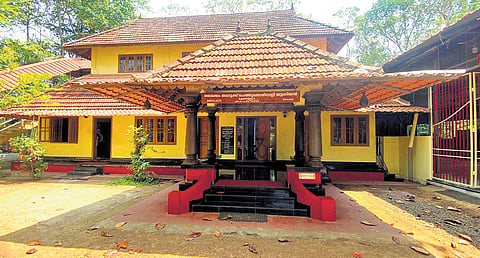

KOCHI: It was on March 10, 1925, that Mahatma Gandhi arrived at Indamthuruthy Mana, which holds a significant place in the historic Vaikom Satyagraha, at the height of casteism and untouchability. His mission was to conduct talks to pursue the upper caste members to open the road to the famous Shiva temple in the town for all sections of hindus in the Travancore region.
But Gandhi himself turned into a victim. Devan Neelakandan Namboodiri, the then chief trustee of the temple and head of the Indamthuruthy Mana, didn’t allow Gandhiji to enter the house as he was a ‘vaishya’.
Gandhiji had to hold the parleys in a temporary pandal erected outside, while Neelakandan and other upper-caste hindus stayed inside the house. However, a poetic justice has been served 100 years later when Tushar Gandhi, the great grandson of Mahatma Gandhi, was welcomed into the house, now the office of a communist-backed union of predominantly lower-caste toddy tappers, with traditional percussion and escorted by hundreds cutting across various castes.
“It’s a poetic justice that was served on the centenary year of Gandhiji’s Vaikom visit. As part of the annual C K Viswanathan commemoration function, we invited Tushar Gandhi, a noted author, and bestowed an award. He arrived at the mana to receive the award on December 24, 2024.
Then we welcomed him into the mana, now owned by our union, accompanied by traditional percussion. While Gandhiji was denied entry to the two-storey structure having a traditional inner courtyard, his grandson was extended a grand welcome 100 years later,” T N Ramesh, general secretary of AITUC Chethu Thozhilali Union, told TNIE. The union now owns the traditional building located at Kochalum Chuvadu Junction near Vaikom Temple.
So how did the ‘mana’ change hands?
Gandhi returned disappointed after his talks with Neelakandan, who held the hereditary title of ‘naduvazhi’, didn’t yield any result. He then arrived at Vaikom to specifically highlight the issue of untouchability. “We have in our religion a black spot which must be removed. It is untouchability and here I am sorry to add also unapproachability,” said Gandhiji.
With reference to his mission at Vaikom he said, “I want to plead wisdom and tell them that this untouchability and unapproachability cannot be part of Hinduism. I have come to tell them that the satyagrahis who are fighting against enormous odds at Vaikom are not out to destroy religion, but to reform it. I have come to tell them of all the implications of this struggle...,” Dr Siby K Joseph, director, Sri Jamnalal Bajaj Memorial Library and Research Centre for Gandhian Studies, Sevagram Ashram Pratishthan, Wardha, quoted Gandhi’s words.
The non-violent Vaikom Satyagraha protest intensified thereafter. “Neelankandan even did a sudhikalasam (purification ritual) there. However, a silent revolution was happening and things changed fast thereafter.
Thirty two years later, the Communist government, headed by EMS Namboodiripad, came into power in 1957, and one of the first reforms introduced was bringing in new legislation on land reforms. A main revenue of the landlords ceased to exist as they could no longer avail ‘paatam’ and all,” Ramesh said.
The next generation of Indamthuruthy Mana faced financial constraints big time. With revenue sources drying up, the households had no option but to put the mana on sale.“ By the time the next generation came, things had changed.
The head of the family, Vasudeval Namboodiri, had a medical condition to treat. Dr Varghese Moothedam, a homeo doctor, learned about the plans to sell the structure and informed the same to comrade C K Viswanathan, a freedom fighter and two-time MLA who founded the Chethu Thozhilali Union,” Ramesh explained.